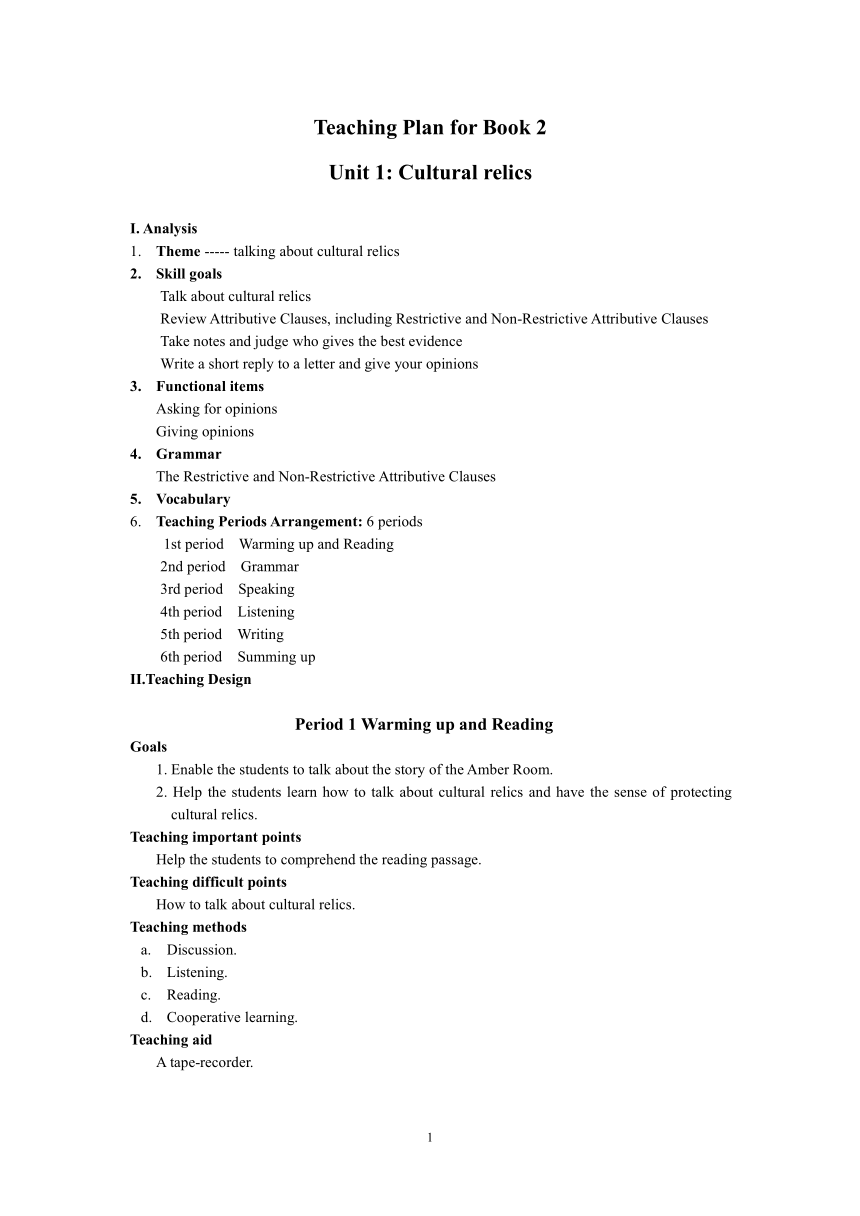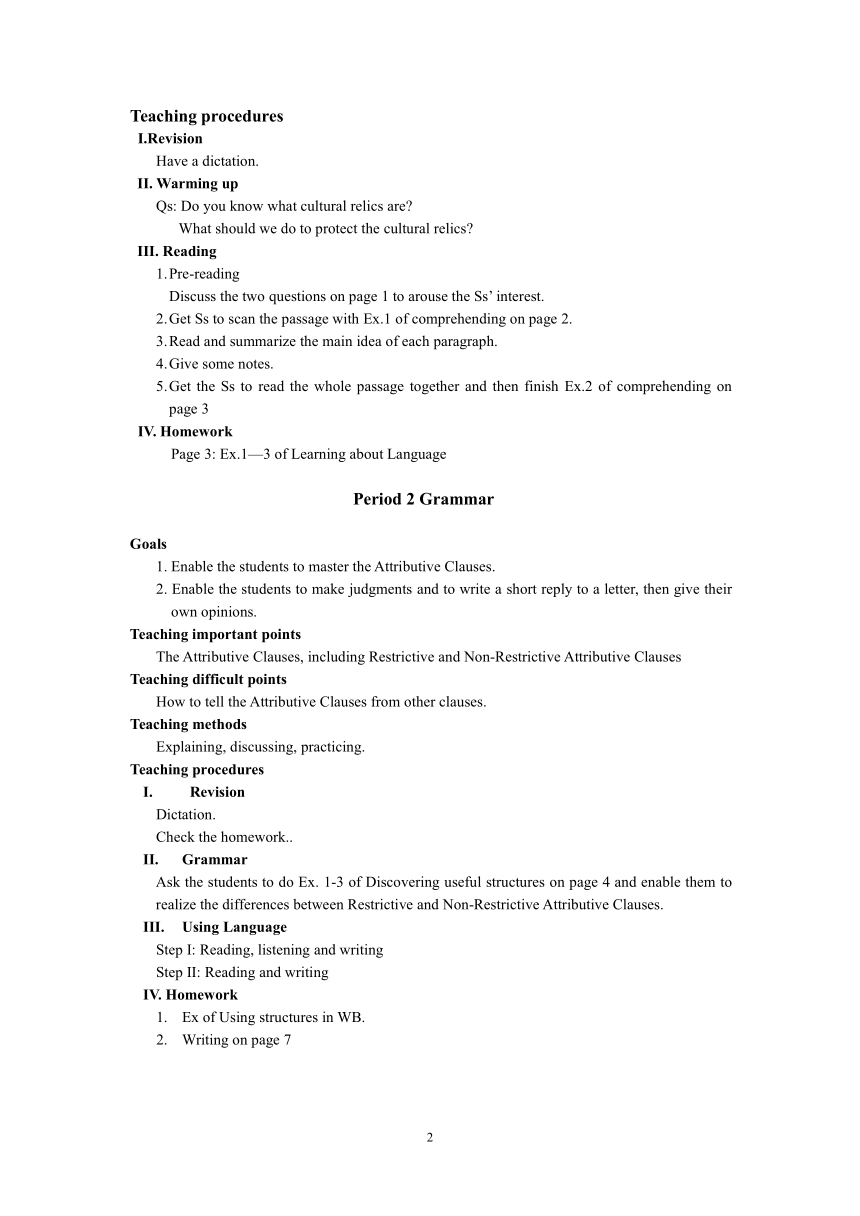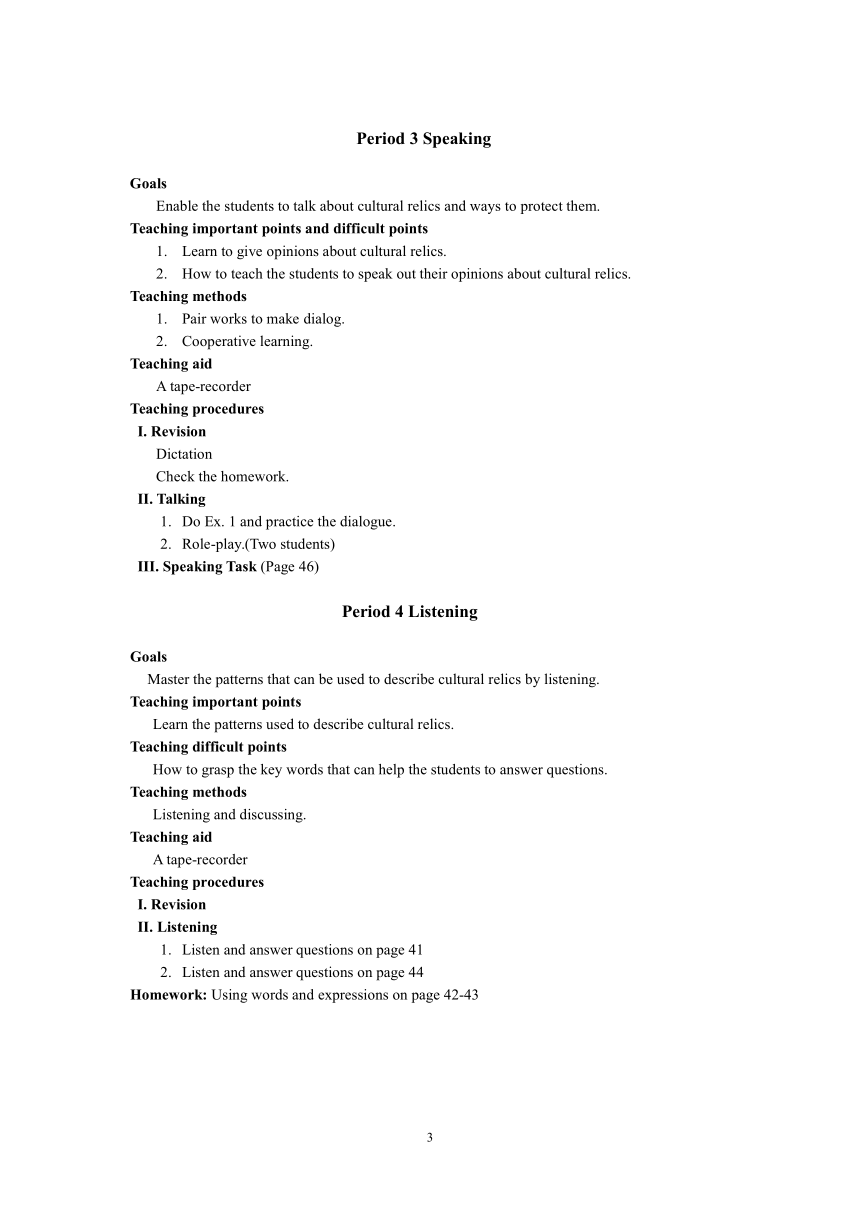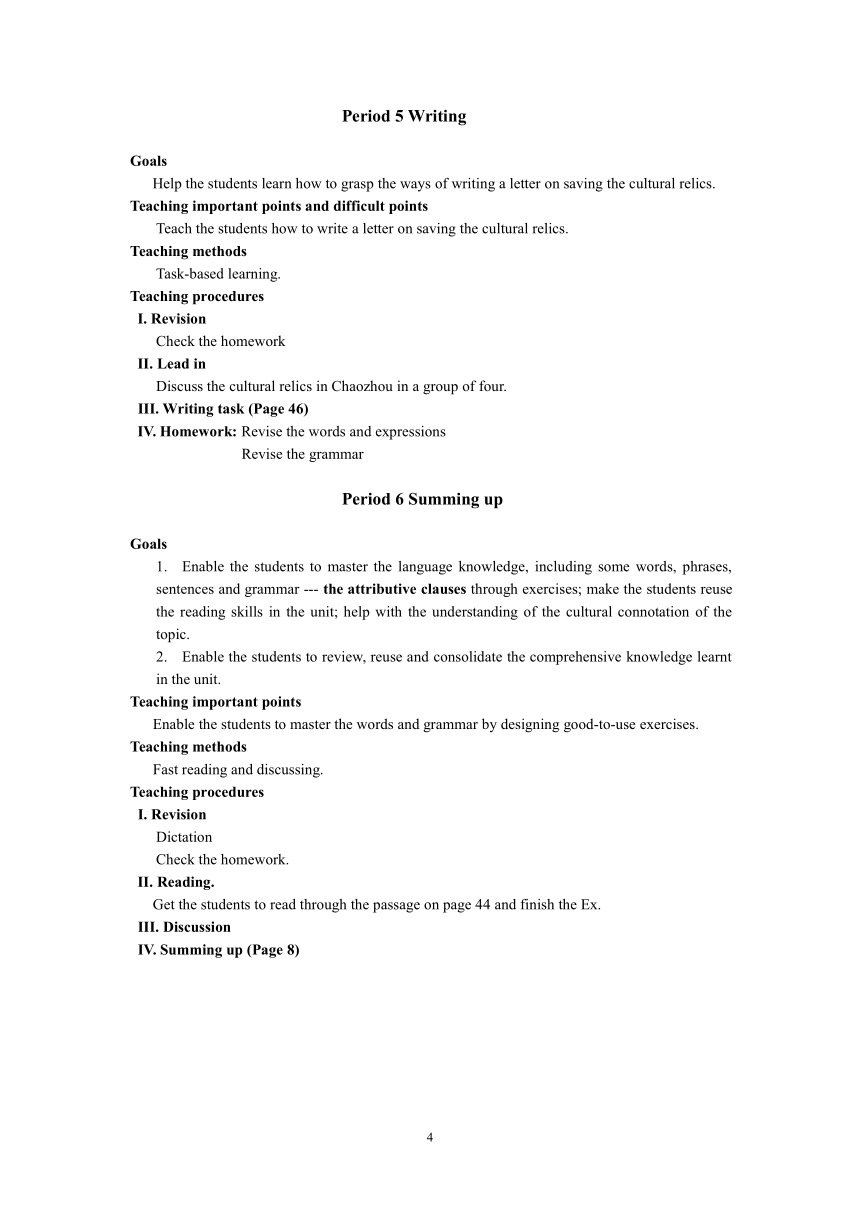必修2 Unit 1 Cultural Relics[上学期]
文档属性
| 名称 | 必修2 Unit 1 Cultural Relics[上学期] |  | |
| 格式 | rar | ||
| 文件大小 | 21.0KB | ||
| 资源类型 | 教案 | ||
| 版本资源 | 人教版(新课程标准) | ||
| 科目 | 英语 | ||
| 更新时间 | 2009-07-16 07:06:00 | ||
图片预览




文档简介
Teaching Plan for Book 2
Unit 1: Cultural relics
I. Analysis
1. Theme ----- talking about cultural relics
2. Skill goals
Talk about cultural relics
Review Attributive Clauses, including Restrictive and Non-Restrictive Attributive Clauses
Take notes and judge who gives the best evidence
Write a short reply to a letter and give your opinions
3. Functional items
Asking for opinions
Giving opinions
4. Grammar
The Restrictive and Non-Restrictive Attributive Clauses
5. Vocabulary
6. Teaching Periods Arrangement: 6 periods
1st period Warming up and Reading
2nd period Grammar
3rd period Speaking
4th period Listening
5th period Writing
6th period Summing up
II.Teaching Design
Period 1 Warming up and Reading
Goals
1. Enable the students to talk about the story of the Amber Room.
2. Help the students learn how to talk about cultural relics and have the sense of protecting cultural relics.
Teaching important points
Help the students to comprehend the reading passage.
Teaching difficult points
How to talk about cultural relics.
Teaching methods
a. Discussion.
b. Listening.
c. Reading.
d. Cooperative learning.
Teaching aid
A tape-recorder.
Teaching procedures
I.Revision
Have a dictation.
II. Warming up
Qs: Do you know what cultural relics are
What should we do to protect the cultural relics
III. Reading
1. Pre-reading
Discuss the two questions on page 1 to arouse the Ss’ interest.
2. Get Ss to scan the passage with Ex.1 of comprehending on page 2.
3. Read and summarize the main idea of each paragraph.
4. Give some notes.
5. Get the Ss to read the whole passage together and then finish Ex.2 of comprehending on page 3
IV. Homework
Page 3: Ex.1—3 of Learning about Language
Period 2 Grammar
Goals
1. Enable the students to master the Attributive Clauses.
2. Enable the students to make judgments and to write a short reply to a letter, then give their own opinions.
Teaching important points
The Attributive Clauses, including Restrictive and Non-Restrictive Attributive Clauses
Teaching difficult points
How to tell the Attributive Clauses from other clauses.
Teaching methods
Explaining, discussing, practicing.
Teaching procedures
I. Revision
Dictation.
Check the homework..
II. Grammar
Ask the students to do Ex. 1-3 of Discovering useful structures on page 4 and enable them to realize the differences between Restrictive and Non-Restrictive Attributive Clauses.
III. Using Language
Step I: Reading, listening and writing
Step II: Reading and writing
IV. Homework
1. Ex of Using structures in WB.
2. Writing on page 7
Period 3 Speaking
Goals
Enable the students to talk about cultural relics and ways to protect them.
Teaching important points and difficult points
1. Learn to give opinions about cultural relics.
2. How to teach the students to speak out their opinions about cultural relics.
Teaching methods
1. Pair works to make dialog.
2. Cooperative learning.
Teaching aid
A tape-recorder
Teaching procedures
I. Revision
Dictation
Check the homework.
II. Talking
1. Do Ex. 1 and practice the dialogue.
2. Role-play.(Two students)
III. Speaking Task (Page 46)
Period 4 Listening
Goals
Master the patterns that can be used to describe cultural relics by listening.
Teaching important points
Learn the patterns used to describe cultural relics.
Teaching difficult points
How to grasp the key words that can help the students to answer questions.
Teaching methods
Listening and discussing.
Teaching aid
A tape-recorder
Teaching procedures
I. Revision
II. Listening
1. Listen and answer questions on page 41
2. Listen and answer questions on page 44
Homework: Using words and expressions on page 42-43
Period 5 Writing
Goals
Help the students learn how to grasp the ways of writing a letter on saving the cultural relics.
Teaching important points and difficult points
Teach the students how to write a letter on saving the cultural relics.
Teaching methods
Task-based learning.
Teaching procedures
I. Revision
Check the homework
II. Lead in
Discuss the cultural relics in Chaozhou in a group of four.
III. Writing task (Page 46)
IV. Homework: Revise the words and expressions
Revise the grammar
Period 6 Summing up
Goals
1. Enable the students to master the language knowledge, including some words, phrases, sentences and grammar --- the attributive clauses through exercises; make the students reuse the reading skills in the unit; help with the understanding of the cultural connotation of the topic.
2. Enable the students to review, reuse and consolidate the comprehensive knowledge learnt in the unit.
Teaching important points
Enable the students to master the words and grammar by designing good-to-use exercises.
Teaching methods
Fast reading and discussing.
Teaching procedures
I. Revision
Dictation
Check the homework.
II. Reading.
Get the students to read through the passage on page 44 and finish the Ex.
III. Discussion
IV. Summing up (Page 8)
Words and Expressions
1.cultural adj.
Cultural relics 文化遗迹
2.survive v.
Eg: He is the last surviving member of the family.
他是这家唯一在世的人。
Many strange customs have survived from earlier times.
有许多古怪的习俗源远流长。
3.remain vi.
Eg: He remained silent after class. 下课后他仍默不作声。
辨析:stay & remain
stay: 最普通用语,或长期或短期,或永远或暂时地停留。
remain: 强调维持原来的状态,表示“逗留”时比stay更正式些。
Eg: 1) You go; I’ll stay here till you come back. 你去吧,我呆在这里直到你回来。
2) How many days will you remain here 你准备在这呆几天?
4.state n.
① 国家
国务院: the State Department
国家关系:state relations
辨析:state,country & nation
三词皆表示“国家”,但state侧重于政权,country侧重于疆土,而nation侧重于民族。
Eg: 1) Railways belong to the state. 铁路属于国家。
2) France and Germany are European countries. 法国和德国是欧洲国家。
3) In 1790 the new nation had fewer than four million people.
1790年时这个新成立的国家的人口不到四百万。
② 状态,状况
Eg: I could not understand his state of mind. 我不懂他的心理。
5.look into
Eg: The police are looking into all the records of the man.
警察正在查阅那个人的所有档案。
Look after 照顾,照料
Look down upon 俯视,轻视
Look out 往外看,注意,当心
Look through 透过……看,浏览
Look up 抬头看,查看(字典)
6.belong vi.
belong to 属于,为……中的一员或一部分
Eg: The dog belongs to him. 狗是他的。
7.in search of
Eg: The boys went in search of something to eat. 男孩们去找吃的东西。
8.gift n.
① 赠品;礼物
= present
② 天赋;天资
Eg: He is a student who has a gift for music. 他是一个有音乐天赋的学生。
He is a man of many gifts. 他是一个多才多艺的人。
9.design
n. 设计,图案,构思;计划,企图
by design 故意地
Eg: Do you think the building was burnt down by accident or design
你认为大楼被烧是意外事故呢,还是他人有意为之?
vt. & vi. 计划,谋划;设计,构思
be designed to do = be designed for 目的是;打算给……用
Eg: The experiment is designed to test the new drug. 实验的目的是为了测试那种新药。
= The experiment is designed for testing the new drug.
10.fancy
adj. 奇特的;异样的,花哨的
vt. 想象(=imagine);设想;爱好
fancy+从句
Eg: Don’t fancy that you can succeed without hard work. 别以为你不努力就能成功。
fancy (one’s) doing sth
Eg: I can’t fancy his doing such a thing. 我想不到他会做这种事。
fancy sb. (to be)…
Eg: I fancied him to be dead. 我以为他死了。
fancy sb. as
Eg: He fancies himself as a good singer. 他自以为是个好歌手。
11.in return
Eg: I wish I could do something for you in return. 我希望能为你做点什么作为报答。
in return for 作为对……的报答,以答谢……
Eg: He bought her a diamond watch in return for her help.
他给她买了一块钻石表以答谢她的帮助。
12.reception n.
give a warm reception to… 热情接待……
get a friendly reception from… 受到……的友好招待
reception desk(旅馆等的)接待处,柜台
13.wonder
n. 奇迹,奇事;惊奇
Eg: The Great Wall is one of the seven wonders in the world. 长城是世界七大奇迹之一。
v. 想知道;对……惊奇,好奇
wonder+疑问词+不定式
Eg: She was wondering whether to go to the cinema or stay at home watching TV.
她对是去看电影还是在家看电视犹豫不决。
wonder+at/about引起的介词短语
Eg: I don’t wonder at her refusing to marry him. 我对她拒绝和他结婚一事毫不惊奇。
wonder+宾语从句
Eg: I wonder who she is. 我想知道她是谁。
14.at war
Eg: When he came back from abroad, his country was at war with Japan.
当他从国外回来时,他的国家正与日本打仗。
at 表示“(行为、状态)在……中”
例如:at school 在上学 at work 在工作 at home 在家 at table 在用餐
15.furniture [U]
一件家具:a piece of furniture 或 an article of furniture
一套家具:a set of furniture
16.doubt
n. 怀疑,疑问
beyond doubt 毫无疑问
in doubt 怀疑,犹豫,不肯定
no / without doubt 毫无疑问,肯定地,想必
vt. 怀疑;不信
doubt+n.
Eg: I doubt the truth of this report. 我怀疑这个报告的真实性。
doubt+of… 对……(抱)怀疑或悲观的态度
Eg: They have never doubted of success. 他们对成功从未怀疑过。
doubt+从句{在否定句及疑问句中多跟that引起的从句
{在肯定句中多跟whether(if)引起的从句
Eg: 1) I don’t doubt that he will come. 我确信他会来。
2) I doubt whether/if he will come. 我不敢确定他会不会来。
17.consider
① “考虑”
consider+n./pron.
Eg: He is considering the plan. 他正在考虑这个计划。
consider+v-ing
Eg: I considered buying a new car. 我考虑过买一辆新车。
consider+疑问词+不定式=consider+宾语从句
Eg: I am considering how to do it well. 我在考虑怎样做好这件事。
=I am considering how I can do it well.
②“认为”
consider+宾语从句
Eg: I consider Kobe Bryant is a gifted basketball player.
我认为科比·布莱恩特是个天才篮球运动员。
consider+n./pron.+(to be)+n./pron. “把……看作”
Eg: I consider him (to be) my best friend. 我把他当作最好的朋友。
consider+it+n./pron.+不定式
Eg: Lei Feng considered it his duty to help others. 雷锋认为帮组别人是他的义务。
18.opinion
依照某人的看法:in one’s opinion+看法,推想,猜测
Eg: In my opinion, we’d better start at once. 依我看,我们应早点动身。
19.prove
① 实义动词:“证明、证实”
prove+n.
Eg: The soldier has proved his courage in battle. 那个战士在战斗中证明了自己的勇敢。
prove+n./pron.+(to be)+adj./n.
Eg: He proved himself to be a capable singer. 他证明了自己是个有实力的歌手。
prove+从句
Eg: They will prove to you that I am not lying. 他们会向你证明我没有说谎。
② 连系动词:“被证明是……”,“结果是”
Eg: He proved (to be) a capable singer. 他被证明是个有实力的歌手。
20.pretend
n. / to do
that 从句
pretend+ to be+n. / adj. 假装是
to be doing 假装正在做某事
have done 假装已做某事
Eg:1) He pretended a headache yesterday. 他昨天假装头疼。
2) Don’t pretend to know what you don’t know. 不要不懂装懂。
3) She pretended to be honest. (= that she was honest.) 她假装诚实。
4) He pretended to be reading a book when his father came back.
当他父亲回来时他假装正在看书。
5) Tom pretended to have had his lunch. 汤姆假装已吃过午饭。
21.think highly of “对……评价高;看重,器重”
think highly / well / much of sb (sth) 对某人(某物)评价很高或印象很好
think badly / poorly / little / ill of sb (sth) 对某人(某物)评价很低或印象很差
22.besides
① adv. 此外,另外,还有 (常用逗号与后面的句子隔开)
Eg: It is too late to go out now. Besides, it’s going to rain.
现在出去太晚了,此外,天快下雨了。
② prep. 除……之外
besides 表示除了一部分还有另一部分
except 表示“除了……之外”,强调从整体中出去部分
Eg: I have some other friends besides you and your sister.
除了你和你妹外,我还有几个朋友。
I have few friends except you. 除了你我几乎没什么朋友了。
Warming up
1. It作为形式主语
2. insist
Pre-reading
1. get后接过去分词
2. do with
Reading
can/could have done
1. can/could never have done
can/could not have done
be made into (原料)被制成(成品)
2. be made of (成品)由……(原料)制成(通过成品可看出原料本色)
be made from (成品)由……(原料)制成(通过成品看不出原料本色)
3.of the fancy style
“(be)of+抽象名词”表示“具有……”
4.It takes sb. time to do sth 做某事花了某人多少时间
5.serve as 担任;充当
6.get to 到达
Learning about Language
1. make noise 发出嘈杂声;吵闹
Using Language
1. answer to ……的答案
2. more…than any other…
3. even though
PAGE
9
Unit 1: Cultural relics
I. Analysis
1. Theme ----- talking about cultural relics
2. Skill goals
Talk about cultural relics
Review Attributive Clauses, including Restrictive and Non-Restrictive Attributive Clauses
Take notes and judge who gives the best evidence
Write a short reply to a letter and give your opinions
3. Functional items
Asking for opinions
Giving opinions
4. Grammar
The Restrictive and Non-Restrictive Attributive Clauses
5. Vocabulary
6. Teaching Periods Arrangement: 6 periods
1st period Warming up and Reading
2nd period Grammar
3rd period Speaking
4th period Listening
5th period Writing
6th period Summing up
II.Teaching Design
Period 1 Warming up and Reading
Goals
1. Enable the students to talk about the story of the Amber Room.
2. Help the students learn how to talk about cultural relics and have the sense of protecting cultural relics.
Teaching important points
Help the students to comprehend the reading passage.
Teaching difficult points
How to talk about cultural relics.
Teaching methods
a. Discussion.
b. Listening.
c. Reading.
d. Cooperative learning.
Teaching aid
A tape-recorder.
Teaching procedures
I.Revision
Have a dictation.
II. Warming up
Qs: Do you know what cultural relics are
What should we do to protect the cultural relics
III. Reading
1. Pre-reading
Discuss the two questions on page 1 to arouse the Ss’ interest.
2. Get Ss to scan the passage with Ex.1 of comprehending on page 2.
3. Read and summarize the main idea of each paragraph.
4. Give some notes.
5. Get the Ss to read the whole passage together and then finish Ex.2 of comprehending on page 3
IV. Homework
Page 3: Ex.1—3 of Learning about Language
Period 2 Grammar
Goals
1. Enable the students to master the Attributive Clauses.
2. Enable the students to make judgments and to write a short reply to a letter, then give their own opinions.
Teaching important points
The Attributive Clauses, including Restrictive and Non-Restrictive Attributive Clauses
Teaching difficult points
How to tell the Attributive Clauses from other clauses.
Teaching methods
Explaining, discussing, practicing.
Teaching procedures
I. Revision
Dictation.
Check the homework..
II. Grammar
Ask the students to do Ex. 1-3 of Discovering useful structures on page 4 and enable them to realize the differences between Restrictive and Non-Restrictive Attributive Clauses.
III. Using Language
Step I: Reading, listening and writing
Step II: Reading and writing
IV. Homework
1. Ex of Using structures in WB.
2. Writing on page 7
Period 3 Speaking
Goals
Enable the students to talk about cultural relics and ways to protect them.
Teaching important points and difficult points
1. Learn to give opinions about cultural relics.
2. How to teach the students to speak out their opinions about cultural relics.
Teaching methods
1. Pair works to make dialog.
2. Cooperative learning.
Teaching aid
A tape-recorder
Teaching procedures
I. Revision
Dictation
Check the homework.
II. Talking
1. Do Ex. 1 and practice the dialogue.
2. Role-play.(Two students)
III. Speaking Task (Page 46)
Period 4 Listening
Goals
Master the patterns that can be used to describe cultural relics by listening.
Teaching important points
Learn the patterns used to describe cultural relics.
Teaching difficult points
How to grasp the key words that can help the students to answer questions.
Teaching methods
Listening and discussing.
Teaching aid
A tape-recorder
Teaching procedures
I. Revision
II. Listening
1. Listen and answer questions on page 41
2. Listen and answer questions on page 44
Homework: Using words and expressions on page 42-43
Period 5 Writing
Goals
Help the students learn how to grasp the ways of writing a letter on saving the cultural relics.
Teaching important points and difficult points
Teach the students how to write a letter on saving the cultural relics.
Teaching methods
Task-based learning.
Teaching procedures
I. Revision
Check the homework
II. Lead in
Discuss the cultural relics in Chaozhou in a group of four.
III. Writing task (Page 46)
IV. Homework: Revise the words and expressions
Revise the grammar
Period 6 Summing up
Goals
1. Enable the students to master the language knowledge, including some words, phrases, sentences and grammar --- the attributive clauses through exercises; make the students reuse the reading skills in the unit; help with the understanding of the cultural connotation of the topic.
2. Enable the students to review, reuse and consolidate the comprehensive knowledge learnt in the unit.
Teaching important points
Enable the students to master the words and grammar by designing good-to-use exercises.
Teaching methods
Fast reading and discussing.
Teaching procedures
I. Revision
Dictation
Check the homework.
II. Reading.
Get the students to read through the passage on page 44 and finish the Ex.
III. Discussion
IV. Summing up (Page 8)
Words and Expressions
1.cultural adj.
Cultural relics 文化遗迹
2.survive v.
Eg: He is the last surviving member of the family.
他是这家唯一在世的人。
Many strange customs have survived from earlier times.
有许多古怪的习俗源远流长。
3.remain vi.
Eg: He remained silent after class. 下课后他仍默不作声。
辨析:stay & remain
stay: 最普通用语,或长期或短期,或永远或暂时地停留。
remain: 强调维持原来的状态,表示“逗留”时比stay更正式些。
Eg: 1) You go; I’ll stay here till you come back. 你去吧,我呆在这里直到你回来。
2) How many days will you remain here 你准备在这呆几天?
4.state n.
① 国家
国务院: the State Department
国家关系:state relations
辨析:state,country & nation
三词皆表示“国家”,但state侧重于政权,country侧重于疆土,而nation侧重于民族。
Eg: 1) Railways belong to the state. 铁路属于国家。
2) France and Germany are European countries. 法国和德国是欧洲国家。
3) In 1790 the new nation had fewer than four million people.
1790年时这个新成立的国家的人口不到四百万。
② 状态,状况
Eg: I could not understand his state of mind. 我不懂他的心理。
5.look into
Eg: The police are looking into all the records of the man.
警察正在查阅那个人的所有档案。
Look after 照顾,照料
Look down upon 俯视,轻视
Look out 往外看,注意,当心
Look through 透过……看,浏览
Look up 抬头看,查看(字典)
6.belong vi.
belong to 属于,为……中的一员或一部分
Eg: The dog belongs to him. 狗是他的。
7.in search of
Eg: The boys went in search of something to eat. 男孩们去找吃的东西。
8.gift n.
① 赠品;礼物
= present
② 天赋;天资
Eg: He is a student who has a gift for music. 他是一个有音乐天赋的学生。
He is a man of many gifts. 他是一个多才多艺的人。
9.design
n. 设计,图案,构思;计划,企图
by design 故意地
Eg: Do you think the building was burnt down by accident or design
你认为大楼被烧是意外事故呢,还是他人有意为之?
vt. & vi. 计划,谋划;设计,构思
be designed to do = be designed for 目的是;打算给……用
Eg: The experiment is designed to test the new drug. 实验的目的是为了测试那种新药。
= The experiment is designed for testing the new drug.
10.fancy
adj. 奇特的;异样的,花哨的
vt. 想象(=imagine);设想;爱好
fancy+从句
Eg: Don’t fancy that you can succeed without hard work. 别以为你不努力就能成功。
fancy (one’s) doing sth
Eg: I can’t fancy his doing such a thing. 我想不到他会做这种事。
fancy sb. (to be)…
Eg: I fancied him to be dead. 我以为他死了。
fancy sb. as
Eg: He fancies himself as a good singer. 他自以为是个好歌手。
11.in return
Eg: I wish I could do something for you in return. 我希望能为你做点什么作为报答。
in return for 作为对……的报答,以答谢……
Eg: He bought her a diamond watch in return for her help.
他给她买了一块钻石表以答谢她的帮助。
12.reception n.
give a warm reception to… 热情接待……
get a friendly reception from… 受到……的友好招待
reception desk(旅馆等的)接待处,柜台
13.wonder
n. 奇迹,奇事;惊奇
Eg: The Great Wall is one of the seven wonders in the world. 长城是世界七大奇迹之一。
v. 想知道;对……惊奇,好奇
wonder+疑问词+不定式
Eg: She was wondering whether to go to the cinema or stay at home watching TV.
她对是去看电影还是在家看电视犹豫不决。
wonder+at/about引起的介词短语
Eg: I don’t wonder at her refusing to marry him. 我对她拒绝和他结婚一事毫不惊奇。
wonder+宾语从句
Eg: I wonder who she is. 我想知道她是谁。
14.at war
Eg: When he came back from abroad, his country was at war with Japan.
当他从国外回来时,他的国家正与日本打仗。
at 表示“(行为、状态)在……中”
例如:at school 在上学 at work 在工作 at home 在家 at table 在用餐
15.furniture [U]
一件家具:a piece of furniture 或 an article of furniture
一套家具:a set of furniture
16.doubt
n. 怀疑,疑问
beyond doubt 毫无疑问
in doubt 怀疑,犹豫,不肯定
no / without doubt 毫无疑问,肯定地,想必
vt. 怀疑;不信
doubt+n.
Eg: I doubt the truth of this report. 我怀疑这个报告的真实性。
doubt+of… 对……(抱)怀疑或悲观的态度
Eg: They have never doubted of success. 他们对成功从未怀疑过。
doubt+从句{在否定句及疑问句中多跟that引起的从句
{在肯定句中多跟whether(if)引起的从句
Eg: 1) I don’t doubt that he will come. 我确信他会来。
2) I doubt whether/if he will come. 我不敢确定他会不会来。
17.consider
① “考虑”
consider+n./pron.
Eg: He is considering the plan. 他正在考虑这个计划。
consider+v-ing
Eg: I considered buying a new car. 我考虑过买一辆新车。
consider+疑问词+不定式=consider+宾语从句
Eg: I am considering how to do it well. 我在考虑怎样做好这件事。
=I am considering how I can do it well.
②“认为”
consider+宾语从句
Eg: I consider Kobe Bryant is a gifted basketball player.
我认为科比·布莱恩特是个天才篮球运动员。
consider+n./pron.+(to be)+n./pron. “把……看作”
Eg: I consider him (to be) my best friend. 我把他当作最好的朋友。
consider+it+n./pron.+不定式
Eg: Lei Feng considered it his duty to help others. 雷锋认为帮组别人是他的义务。
18.opinion
依照某人的看法:in one’s opinion+看法,推想,猜测
Eg: In my opinion, we’d better start at once. 依我看,我们应早点动身。
19.prove
① 实义动词:“证明、证实”
prove+n.
Eg: The soldier has proved his courage in battle. 那个战士在战斗中证明了自己的勇敢。
prove+n./pron.+(to be)+adj./n.
Eg: He proved himself to be a capable singer. 他证明了自己是个有实力的歌手。
prove+从句
Eg: They will prove to you that I am not lying. 他们会向你证明我没有说谎。
② 连系动词:“被证明是……”,“结果是”
Eg: He proved (to be) a capable singer. 他被证明是个有实力的歌手。
20.pretend
n. / to do
that 从句
pretend+ to be+n. / adj. 假装是
to be doing 假装正在做某事
have done 假装已做某事
Eg:1) He pretended a headache yesterday. 他昨天假装头疼。
2) Don’t pretend to know what you don’t know. 不要不懂装懂。
3) She pretended to be honest. (= that she was honest.) 她假装诚实。
4) He pretended to be reading a book when his father came back.
当他父亲回来时他假装正在看书。
5) Tom pretended to have had his lunch. 汤姆假装已吃过午饭。
21.think highly of “对……评价高;看重,器重”
think highly / well / much of sb (sth) 对某人(某物)评价很高或印象很好
think badly / poorly / little / ill of sb (sth) 对某人(某物)评价很低或印象很差
22.besides
① adv. 此外,另外,还有 (常用逗号与后面的句子隔开)
Eg: It is too late to go out now. Besides, it’s going to rain.
现在出去太晚了,此外,天快下雨了。
② prep. 除……之外
besides 表示除了一部分还有另一部分
except 表示“除了……之外”,强调从整体中出去部分
Eg: I have some other friends besides you and your sister.
除了你和你妹外,我还有几个朋友。
I have few friends except you. 除了你我几乎没什么朋友了。
Warming up
1. It作为形式主语
2. insist
Pre-reading
1. get后接过去分词
2. do with
Reading
can/could have done
1. can/could never have done
can/could not have done
be made into (原料)被制成(成品)
2. be made of (成品)由……(原料)制成(通过成品可看出原料本色)
be made from (成品)由……(原料)制成(通过成品看不出原料本色)
3.of the fancy style
“(be)of+抽象名词”表示“具有……”
4.It takes sb. time to do sth 做某事花了某人多少时间
5.serve as 担任;充当
6.get to 到达
Learning about Language
1. make noise 发出嘈杂声;吵闹
Using Language
1. answer to ……的答案
2. more…than any other…
3. even though
PAGE
9
